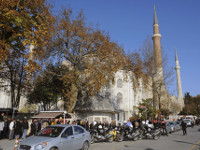Turkish government corruption scandal
The Turkish government is shaken with a corruption scandal; several ministers and businessmen close to the AKP party are involved. Erdogan immediately stages a cover up to protect his establishment, but it seems too late.

It all begun on Tuesday December 17th when, after 14 months of secret investigations, the Turkish police arrested 52 people. In later raids, 30 more suspects were detained in connection to corruption allegations linked to bribery in public tenders. At least 24 suspects, including the sons of two ministers and Iranian businessman Reza Zerrab, were put behind bars while most of other suspects were released pending trial.
The operation was kept top-secret due to high ranks of the individuals under investigation.
In one of the raids the police found a banknote counter and six coffers full of Turkish liras and euros in the home of the son of Turkish Interior Minister, Muammer Güler. In another raid, police found 4.5 million euros stuffed inside shoe boxes in the residence of the chief of the state-owned Halkbank.
Other sources talk about the Minister of Economy, Zafer Caglayan and three other ministers accepting bribes worth millions of euros from the Iranian businessman Reza Zarrab in order to carry out his illegal business transactions with Iran.
An issue that once again raises concerns over the summer 2013 rumors about builders and contractors having close ties to the ruling AKP establishment being authorized to demolish old buildings in the working class areas of Istanbul such as Emekevler, with a goal to replace them with luxury apartment complexes.
In many cases, the inhabitants are thrown out of their houses after being given little money and left with nowhere to go.
As pointed out by sources:
"Today, a tragedy took place in Emekevler, Istanbul. People were forced out of their houses, left homeless with nowhere to go. With all the panic from the municipality and the government, they were violently rushed out of the homes. Because, new tall buildings were going to be built in place of their 'shanty' houses. One of the construction firms that's going to lodge all the concrete there, is owned by someone everybody knows very intimately. He happens to be our president's son in law".
And again:
"The little district of Emekevler that is populated by trees and small houses, is a refreshing sight among all that cement. However, recently the municipality has ascribed the area to a construction firm. Instead of 400 houses, they will build 3500 apartments. The new buildings will be a complex that contains luxury facilities, like swimming pools, parking lots, etc".
These are the consequences of Erdogan's neo-liberal policies that clearly step on the needs of the people for the benefit of a few of those who belong to the high ranks close to the government.
Throughout 2013, the Turkish people have seen attempts to destroy the few green areas that are left in Istanbul in order to replace them with shopping centers and other facilities. Erdogan's policies had no mercy even for important historical sites such as the Emek Theater, causing anger among the population and with the strong disapproval of the Turkish First Lady, Hayrunissa Gul.
The Taksim Park redevelopment, that would have brought to the demolition of a part of the green area to build a mall, raised many questions, in particular over the choice of the Kalyon Group as the project's main contractor; a company which has close ties with the ruling AKP.
As the investigations started the AKP government has tried in every possible way to cover up and boycott the judicial process as proven by Erdogan's embarrassing counter-measures; authorities removed nearly 100 police chiefs who were either involved in the raids or pose a possible threat to the government. Two additional prosecutors were appointed to supervise the investigations; a clear attempt to control the judicial process. The government has launched an unprecedented witch-hunt in public institutions and continues to target anyone believed to cooperate with prosecutors.
Four ministers whose names were linked to the corruption scandal refused to step down despite calls from the opposition and the police attacked people on the streets asking for the resignation of the involved politicians.
But the most embarrassing element of Erdogan's response was the attempt to convince people about an imaginary external body within the state that has global links and was planning to destroy his government.
A possible reference to his former ally, Fetullah Gulen, and his "Hizmet" movement, with several members among government institutions and education facilities throughout the country.
Gulen has progressively become skeptical about Erdogan's internal and foreign policies, including the AKP support for the Syrian rebel groups, many of which spread Islamic extremism.
Once again the paranoid rhetoric of conspiracy has been brought up by Erdogan's establishment, just like during the Taksim protest, when the foreign press was accused of plotting against the Turkish government; an inadequate way of handling the crisis often combined with heavy police repression that will only make the situation worse.
In 2002 the Turkish people voted for the AKP due to the party's strong position against corruption and it will now become very hard for Erdogan to regain credibility and, with the local elections coming up in March 2014, this could become a serious problem for the Islamist party. A possible beginning of the end for the AKP government.
Giovanni Giacalone
Subscribe to Pravda.Ru Telegram channel, Facebook, RSS!

